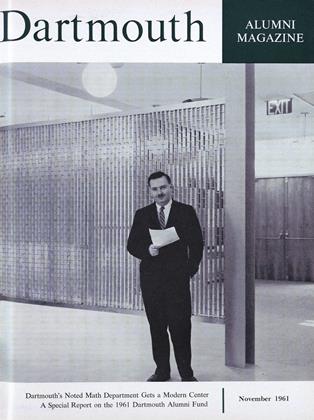Lyrics Done, Music Needed
TO THE EDITOR:
Here are some lyrics for a new Dartmouth song.
Maybe you know some graduate or undergraduate with musical talent who might be able to use them.
If anyone would like to fool around with these lyrics, he has my permission to make any alterations the music might call for.
LET'S SING ALONG A DARTMOUTH SONG I
On the high road ... or the low road From Lebanon to Rome, Let's sing along a Dartmouth song As we go rolling home.
Let's sing of swinging birches, Pines dark against the hills, Let's sing of Dartmouth heroes, Remember Big Green thrills.
(Chorus)
Let's sing a song of Carnival And Dartmouth girls so dear, Let's sing of Dartmouth's glory, Lift our voices loud and clear.
(Chorus)
Let's sing of Eleazar, Beat loud the Big Green drum, Let's sing of Dartmouth legends To the last damn drop of rum.
(Chorus)
Let's sing of old traditions, Cool ivy on the wall. Let's sing of storied Dartmouth As the night begins to fall.
On the high road ... or the low road From Lebanon to Rome, Let's sing along a Dartmouth song As we go rolling home.
San Diego, Calif.
Muscular Agony Relieved
TO THE EDITOR:
Richard Hovey '85 wrote song lyrics that were plain as galoshes, but pretty as Balch Hill. Every line of Men of Dartmouth is a prize. All except:
And the granite of New Hampshire In their muscles and their brains.
Since my first Freshman Smoker I have rebelled at the idea of "granite brains." Too close to "solid ivory" and "bonehead." Never liked it. True or not.
But now I feel much better about Hovey. My gripe is gone. This past June, in Hanover, I saw the manuscript of Men of Dartmouth on display in Baker. It says:
And the granite of New Hampshire In their muscle and their brains.
I "Muscle" is singular, not plural. "Muscle and brains" becomes a poetic figure like "brains and brawn" or "mind and matter." The idea is now clear: we have the stuff of New Hampshire in our whole being. The poet is not commenting - as "muscles" suggests - on the gneiss content of our biceps or cerebella.
The poem was written, and corrected, on Easter Day, 1894, in Boston. It first appeared in print in the Dartmouth LiteraryMonthly for June 1894. Is that where the extra "s" was added? The music was written in 1898 and appeared in Dartmouth Songs, published that same year, just two years before Richard Hovey died at the youthful age of 36.
I don't really care when or how the error started. I'm just mighty relieved to know the original version. It makes good sense and better poetry. Don't you agree?
Bedford, N. Y.
 View Full Issue
View Full Issue
More From This Issue
-
 Feature
FeatureThe Cold War and Liberal Learning
November 1961 -
 Feature
FeatureChairman's Report
November 1961 -
 Feature
FeatureA New Center for Mathematics
November 1961 -
 Feature
FeatureHOW THE "IVY LEAGUE" GOT ITS NAME
November 1961 -
 Feature
FeatureClub Officers Meet in Hanover
November 1961 -
 Feature
FeatureLASS ACHIEVEMENTS 1961 FUND
November 1961







